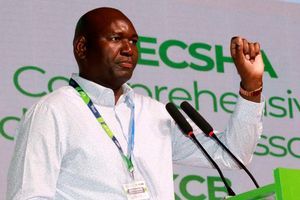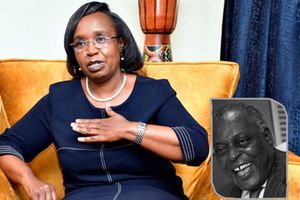Premium
Meet Kenya’s first female and youngest Chief of Staff to the Chief Justice

Rose Wachuka is Kenya's first female and youngest Chief of Staff to the office of the Chief Justice. Photo | Pool
What you need to know:
- Rose Wachuka, is a woman of many firsts. The 36-year-old rose from a humble background and is now the Chief of Staff to Kenya’s Chief Justice Martha Koome
Rose Wachuka is living her childhood dream. Growing up, her grandfather told her that there are two things that can impoverish you— a court case, and two, an illness.
“Having witnessed people go to court for ages and sometimes even die before justice is served made me know I really wanted to advocate for social justice,” says the 36-year-old who describes herself as a simple but hearty person.
Rose is Kenya’s first female and youngest Chief of Staff to serve in the Office of the Chief Justice. Born in Nyandarua County where she spent the first 10 years of her life, she says she associates a lot of her personality and character today, with that formative period. The family moved to Nyeri County, where she completed her primary and secondary education before she enrolled for a Law degree at Moi University.
In 2011 Rose was admitted as an advocate of the High Court.
At Waweru Gatonye law firm, Rose, the only girl in a family of five siblings, says she learnt a lot as a pupil.
“We handled very high profile cases like I remember challenging the appointment of the Director General of National Intelligence Service (NIS) at the time. We also handled the Delarue case among others,” she says.
Still, she was not at peace. “I felt that I was defending individuals- the clients instead of defending the constitution because, you know, when you defend a particular person, you have to tailor your case to their interests. Much as I loved what I was doing, I wanted to be in a position where I’d be impartial to the constitution,” Rose recounts.
Soon after, the judiciary advertised for legal researcher positions. “I applied and was lucky enough to be ranked among the top seven who were sent to the Supreme Court. We were the first cohort,” says Rose, who joined the Judiciary in 2012.
Again, luck smiled her way, because she was on the right side of history.
“We got into the judiciary, just as the wave of change was coming (the new constitution was promulgated on 27 August 2010). The positions had just been established and so we found ourselves growing with the court. The seven of us ended up forging very solid and close relationships with the judges— relationships that have stood the test of time,” she notes nostalgically.
In 2013, the first Presidential Election petition was filed and Rose was tasked with sorting the petition reading at the registry. “I was 25 and I remember spending nights in the registry waiting for the files to be brought in and going through them without tiring, because that was such a monumental part in our country's history,” she says.
“I was the youngest and having to do research for the judges who were in turn supposed to give the country direction was huge and remarkable for me. It was actually the first time that I really looked and considered the career pathway of a judge because I saw firsthand just how influential judges are,” Rose adds.
Rose would then join United States International University (USIU) for a Masters in International Relations, Diplomacy and Foreign Policy. As fate would have it, she got a Chevening Scholarship to study at Oxford University. But the course was very costly and the scholarship could not cover the tuition fee in totality.
“It only covered about £20,000 (about 3 million shillings) and my course was £66,000 (9.6 million shillings). I desperately needed to meet the Chief Justice, Willy Mutunga to express my predicament. One day I caught up with him at the entrance of his office and told him, ‘CJ, look, I have an opportunity to go to Oxford, but I don't have school fees.’ And he said to me, ‘Go and see Duncan (his chief of staff and Kenya’s first Chief of staff), and find resources from the Chief Justice Scholarship account’”
Immediately, she went to Duncan’s office and made her request. Interestingly, she now sits in the same office she had gone to beg for funding.
Her request granted, in 2015, Rose left for Oxford University at the Blavatnik School of Government. “We were 120 of us from 118 countries and I was the second Kenyan ever to go to the school. While there, I was very interested in Universal Health Care (UHC) and in education,” she recounts.
While in the UK, she got a call from Amina Mohamed’s office. Ms. Mohamed was the Cabinet Secretary for Foreign Affairs and was looking to fill the position of an advisor and Justice Njoki Ndungu, having worked closely with Rose, had recommended her.
“The CS’s personal assistant told me that she wanted me to look at a speech for the World Trade Organisation (WTO) conference. I remember I had exams the following day, but I worked on that speech for three hours, sent it to the CSs office, and then stayed up until almost dawn studying for my exams. Later, when I listened to CS delivering the speech at the WTO, I was so proud of myself. That was the first interview and I passed,” Rose says with a smile.
“The second interview was to look at the statement for the Tokyo International Conference on African Development (TICAD). I looked at it, revised it, and sent it back. I didn't hear from the Ministry of Foreign Affairs for a very long time. So I went ahead, cleared my studies, and came back home,” Rose says.
In October 2016, a week after her return, she received a call from CS Amina office asking for a meet-up.
“I remember it was on a Saturday and I was dressed up for a wedding. Being one to never give excuses, I changed from the wedding attire and met the CS,” says Rose who is a fashion enthusiast and designs some of her own clothes.
“When I got there, the CS told me, look, I have just received instructions from the President, to put in my papers for the AU chairperson’s position. I need you to prepare my CV in this format. It’s a Saturday and all those documents are required by tomorrow evening in Addis Ababa. And they need to be in English, Arabic, and French. I immediately got down to work and that was the beginning of me working as CS Amina’s Chief of Staff. I moved with her to the Ministries of Education and eventually Sports,” she notes saying she enjoyed working for CS Amina as she is an impressive boss.
With the 2022 elections nearing, it was time for Rose to spread her wings. She did not want to be caught up in the whole political wave and transition and being the sole breadwinner in her family, she didn’t want to take chances. But again, luck smiled upon her when a friend of hers forwarded a job advertisement that was quite interesting, this was in early 2021. The Commonwealth was looking for a Deputy Chief of Staff and she decided to give it a shot and applied.
“I was shortlisted and did many rounds of interviews one of which was with the Commonwealth Secretary-General, Patricia Scotland. She told me that there was another position that had been open for a long time and they had failed to get a suitable person but she was sure I was the right candidate. It was a very senior position as the Public Affairs Adviser to the Secretary-General. We had a deal.
But then her life got more interesting. “I had just accepted the position when I got a call from the new Chief Justice, Martha Koome, she was a few weeks in office. She said she was looking for a Chief of Staff and had been told that I was the right person for the position,” Rose shares.
“What should she do?” she caught up.
“This remains one of the most difficult decisions I have ever made in my life. I remember thinking, your country does not ask you to stay and serve and you say no. So I wrote a letter to Commonwealth declining their offer. And that is how I ended up here as the Chief of Staff,” she chuckles.
Away from her work, Rose has about 15 children that she sponsors in different schools.




